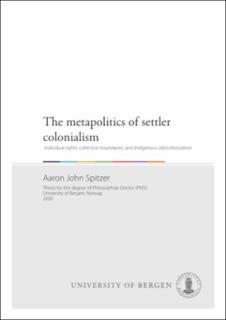| dc.contributor.author | Spitzer, Aaron John | |
| dc.date.accessioned | 2020-06-11T07:35:22Z | |
| dc.date.available | 2020-06-11T07:35:22Z | |
| dc.date.issued | 2020-06-19 | |
| dc.date.submitted | 2020-06-04T08:03:51.938Z | |
| dc.identifier | container/e8/7b/d6/97/e87bd697-f23d-46b4-91a2-bfcec71157d5 | |
| dc.identifier.isbn | 9788230869215 | |
| dc.identifier.isbn | 9788230864784 | |
| dc.identifier.uri | https://hdl.handle.net/1956/22538 | |
| dc.description.abstract | Metapolitics are like the forces inside the atom, so constitutive of the world around us that they hide in plain sight. If domestic politics happens within polities, and geopolitics happens between them, metapolitics decides which is which. I contend this is one way to look at settler colonialism. Over the past few centuries, settler colonialism has transformed the globe, re-crafting Indigenous continents into a New World modelled on the European motherland. This re-crafting has been accomplished in part through metapolitics. “We” have not merely taken what is theirs, we have done so by redefining it, morally, legally, and constitutionally, as ours. Thus veiled by metapolitics, contemporary settler colonies hide in plain sight. In this dissertation my aim was to theorize settler-colonial metapolitics, making it visible. I pursued this project in three steps. First I identified an array of contemporary settler (and related) metapolitical conflicts and classified them in an original taxonomic table of cases. Second, drawing from this table, I conducted four comparative case studies – the articles of my dissertation. Each article explores theoretical, judicial and political dimensions of settler metapolitics in the three most iconic settler states, the United States, Canada and Australia. Finally, I devised a theoretical model to better identify, understand, and address settler metapolitical conflicts. At its core, the theory is this: Contemporary settler colonialism harnesses individual liberal rights, which are the core rights within polities, to problematize boundaries between polities, challenging the legitimacy of Indigenous demotic and territorial difference and thereby dissolving “them” into “us.” This dissertation is, I believe, an original contribution to three sub-fields of political science. First, it contributes to settler-colonial studies, highlighting a largely unexplored means by which contemporary settlers advance colonization and/or resist decolonization. Second, it contributes to political theory, applying a framework to a nameless theoretical space that has become busy with such unreconciled concepts as “mega-politics” (Hirschl 2008), “sovereignty studies” (Aleinikoff 2000), the “law of democracy” (Issacharoff, Karlan and Pildes 2002), “trans-polity rights” (Kant 1795 [2015]), “cosmopolitan rights” (Benhabib 2004), “democratic inclusion” (Bauböck 2017), the “boundary problem” (Whelan 1983), and of course “metapolitics” (Fraser 2009). Third, it contributes to constitutional law, by identifying metapolitics as a (critically overlooked) legal matter, by cataloging dozens of metapolitical cases from around the globe, and by showing decision-makers how they might grapple with such cases. | en_US |
| dc.language.iso | eng | eng |
| dc.publisher | The University of Bergen | eng |
| dc.relation.haspart | Paper I: Spitzer, A. J. (2018). Reconciling Shared Rule: Liberal Theory, Electoral-Districting Law and “National Group” Representation in Canada. Canadian Journal of Political Science/Revue canadienne de science politique, 51(2), 447-466. The article is available in the main thesis. The article is also available at: <a href="https://doi.org/10.1017/S0008423918000033" target="blank">https://doi.org/10.1017/S0008423918000033</a> | eng |
| dc.relation.haspart | Paper II: Spitzer, A. J. (2019). Colonizing the demos? Settler rights, Indigenous sovereignty, and the contested ‘structure of governance’in Canada’s North. Settler Colonial Studies, 9(4), 525-541. The article is available at: <a href="http://hdl.handle.net/1956/22536" target="blank">http://hdl.handle.net/1956/22536</a> | eng |
| dc.relation.haspart | Paper III: Spitzer, A. J. (2019). ‘A wolf in sheep’s clothing’: settler voting rights and the elimination of the Indigenous demos in US Pacific territories. Postcolonial Studies, 22(2), 131-149. The article is available at: <a href="http://hdl.handle.net/1956/21631" target="blank">http://hdl.handle.net/1956/21631</a> | eng |
| dc.relation.haspart | Paper IV: Spitzer, A. J. (2019). Constituting settler colonialism: the ‘boundary problem’, liberal equality, and settler state-making in Australia’s Northern Territory. Postcolonial Studies, 22(4), 545-564. The article is available at: <a href="http://hdl.handle.net/1956/22537" target="blank">http://hdl.handle.net/1956/22537</a> | eng |
| dc.rights | In copyright | eng |
| dc.rights.uri | http://rightsstatements.org/page/InC/1.0/ | eng |
| dc.title | The metapolitics of settler colonialism : Individual rights, collective boundaries, and Indigenous (de)colonization | eng |
| dc.type | Doctoral thesis | en_US |
| dc.date.updated | 2020-06-04T08:03:51.938Z | |
| dc.rights.holder | Copyright the author. All rights reserved. | en_US |
| fs.unitcode | 15-13-0 | |
